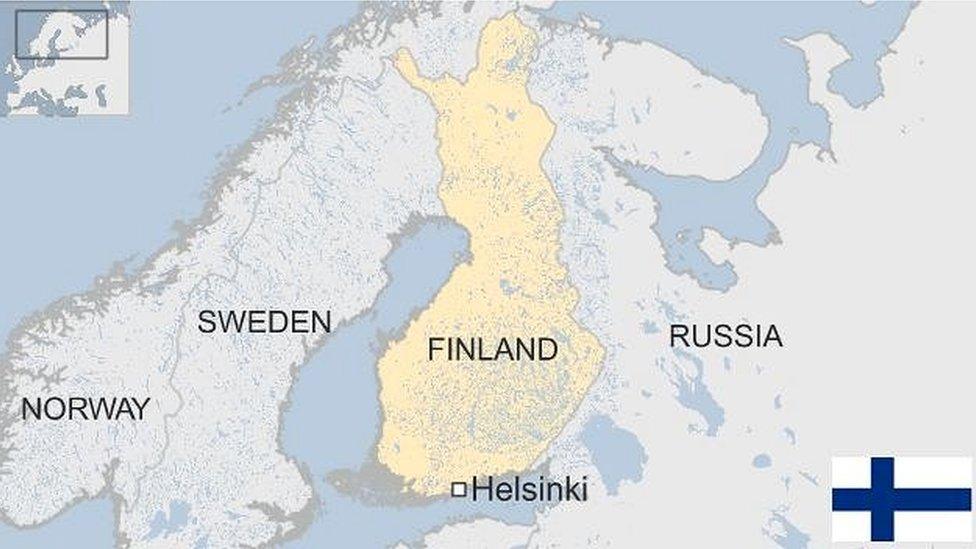Could subjects soon be a thing of the past in Finland?
- Published
Finland has one of the best education systems in the world.
Finland has long been renowned for the quality of its education and always scores highly in international league tables.
Now it is rethinking how it teaches in the digital age - seeking to place skills, as much as subjects, at the heart of what it does. But not everyone is happy, and there are fears it could bring down standards.
It is a chilly morning in a remote village in southern Finland, but the thoughts of this class of 12-year-olds are elsewhere - in ancient Rome.
Their teacher is taking them through a video re-enactment - shown on the classroom's interactive smart board - of the day Mount Vesuvius erupted and destroyed the city of Pompeii.
In groups they take out their mini laptops. Their task is to compare ancient Rome with modern Finland. One group looks at Roman baths and today's luxury spas; another puts the Colosseum up against modern-day stadiums.

They use 3D printers to create a miniature of their Roman building, which will eventually be used as pieces for a class-wide board game.
This is a history lesson with a difference, says Aleksis Stenholm, a teacher at Hauho Comprehensive School. The children are also gaining skills in technology, research, communication and cultural understanding.
"Each group is becoming an expert on their subject, which they will present to the class," he explains. The board game is the culmination of the project, which will run alongside normal classroom teaching.
How Finland has shaken up teaching for the 21st Century
For nearly two decades, Finland has enjoyed a reputation for having one of the world's best education systems. Its 15 year olds regularly score amongst the highest in the global Pisa, external league tables for reading, maths and science.
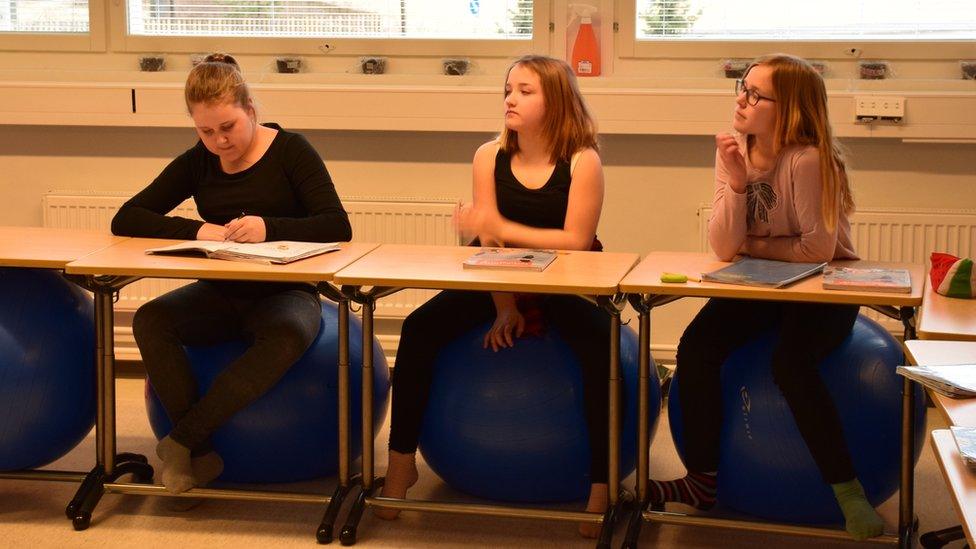
Exercise balls replace chairs in this classroom at Hauho school
Its ability to produce high academic results in children who do not start formal schooling until the age of seven, have short school days, long holidays, relatively little homework and no exams, has long fascinated education experts around the world.
Despite this, Finland is shaking up the way it is doing things - a move that it says is vital in a digital age where children are no longer reliant on books and the classroom to gain knowledge.
In August 2016 it became compulsory for every Finnish school to teach in a more collaborative way; to allow students to choose a topic relevant to them and base subjects around it. Making innovative use of technology and sources outside the school, such as experts and museums, is a key part of it.
The aim of this way of teaching - known as project- or phenomenon-based learning (PBL) - is to equip children with skills necessary to flourish in the 21st Century, says Kirsti Lonka, a professor of educational psychology at Helsinki University. Among the skills she singles out are critical thinking to identify fake news and avoid cyber-bullying, and the technical ability to install anti-virus software and link up to a printer.
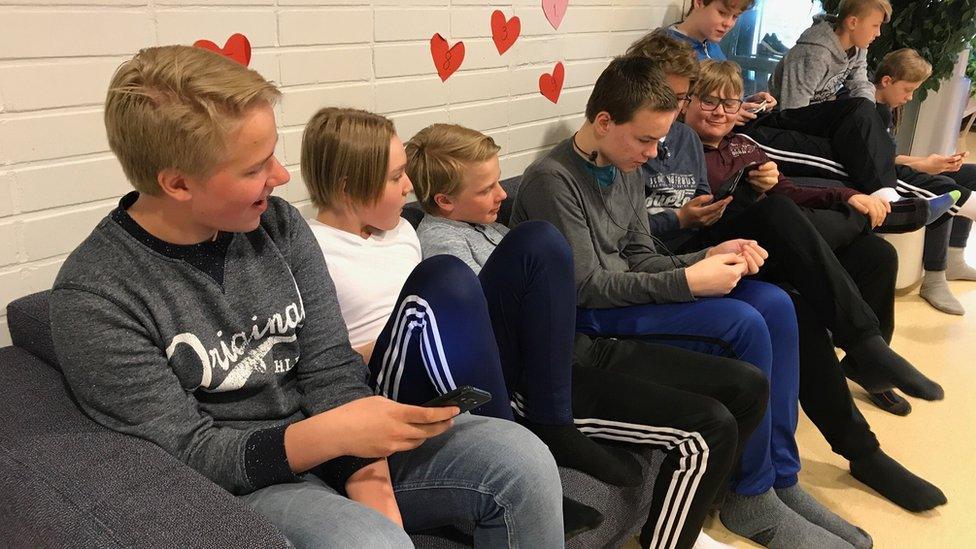
The school at Hauho is relaxed about the children using their mobile phones in class as well as in the lunch hour
"Traditionally, learning has been defined as a list of subject matters and facts you need to acquire - such as arithmetic and grammar - with some decoration, like citizenship, built in around it," Ms Lonka says.
"But when it comes to real life, our brain is not sliced into disciplines in that way; we are thinking in a very holistic way. And when you think about the problems in the world - global crises, migration, the economy, the post-truth era - we really haven't given our children the tools to deal with this inter-cultural world.
"I think it is a major mistake if we lead children to believe the world is simple and that if they learn certain facts they are ready to go. So learning to think, learning to understand, these are important skills - and it also makes learning fun, which we think promotes wellbeing."
How Finland is ditching classroom traditions
Hauho Comprehensive School is nestled among forests and lakes, some 40 minutes drive north-east of the city of Hameenlinna.
With just 230 pupils aged between seven and 15, it has a homely feel. Shoes are left at the front entrance, exercise balls are used instead of chairs in some classrooms, and there are pull-up bars in the doorways.
Teachers are relaxed about mobile phones in the classroom; it is a chance, they say, for children to appreciate their value as a research tool, not just as a means for communicating with their friends.
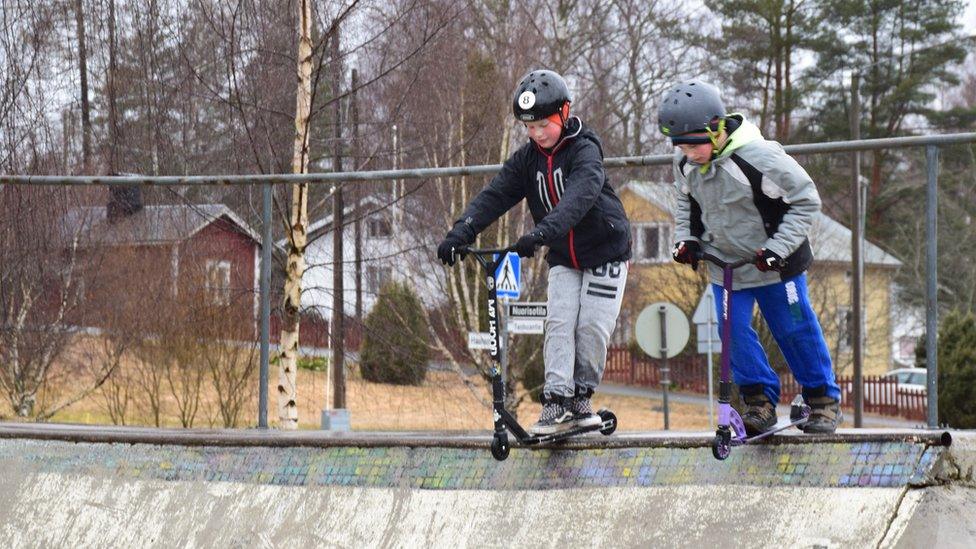
The school's skate park came from an idea suggested by the children, who helped design and raise funds for it
On this cold day, the older students huddle around their phones during the lunch hour while some of the younger children brave the snow flurries to use the skate park, football and basketball pitches.
Head teacher Pekka Paappanen is a firm believer in PBL and looks for a variety of ways of integrating it into the school's curriculum.
"I talk through ideas with our teachers, and then I make sure there is time and space in the schedule for them to happen," he explains.
"I think teachers have more power in this way, but they have to realise they can't do everything. We are leaving some old traditions behind, but we are taking it slowly too - the job of teaching our children is too important and we mustn't get it wrong."
Tackling Europe's biggest issues in class
One big project last year was on the subject of immigration, when the flow of migrants into Europe was making headlines around the world.
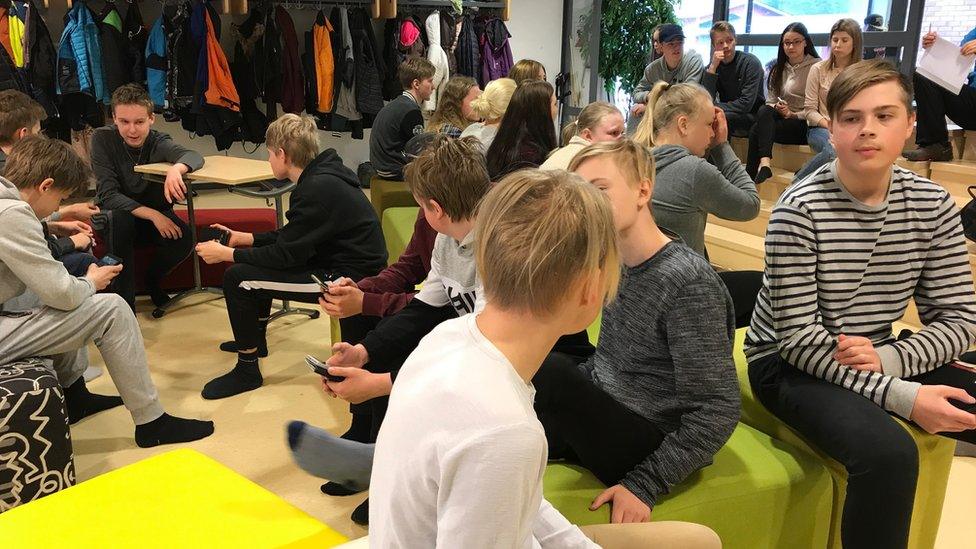
The children linked up with German pupils to compare their understanding of immigration
Aleksis Stenholm says they chose the topic because it became clear many of their students had little personal experience of immigrants and immigration. The topic was incorporated into German and religious classes.
Their 15-year-olds carried out street surveys to garner local opinions about immigration, and they visited a nearby immigration centre to interview asylum seekers. They shared their findings via video-link with a school in Germany, which had carried out a similar project.
"It was really powerful, how the students reacted to it. They started thinking about things, questioning their opinions," Mr Stenholm recalls.
"If I had just taught this over, say, the course of three lessons, the effect would have been very different."
But does it work?
The idea behind phenomenon-based learning has its critics. Some, like physics teacher Jussi Tanhuanpaa, fear it does not provide children with a strong enough grounding in a subject to enable them to study it at a higher level.
He teaches in Lieto, just outside the south-west city of Turku, and says that of one cohort of children he knew who took advanced-level maths post-16, some 30% of them had to drop down a level.
He also worries it is widening the gap between the most and least able students - a gap that has been historically small in Finland.
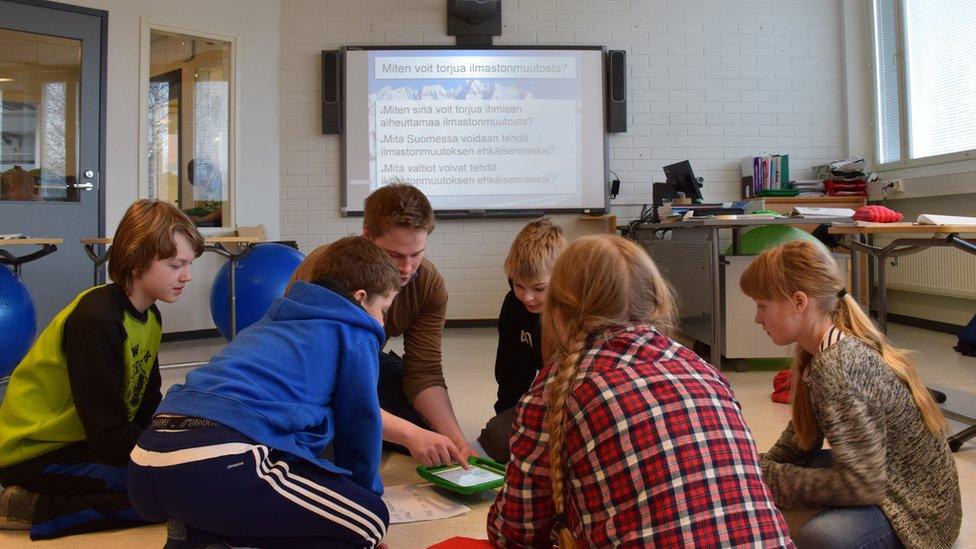
A smart board and tablet computers are used for this lesson on climate change
"This way of teaching is great for the brightest children who understand what knowledge they need to take away from an experiment. It allows them the freedom to learn at their own pace and take the next steps when they are ready to," he says.
"But this is not the case for children who are less able to figure it out for themselves and need more guidance. The gap between the brightest and the less able has already begun widening and I am very afraid that this will only get worse".
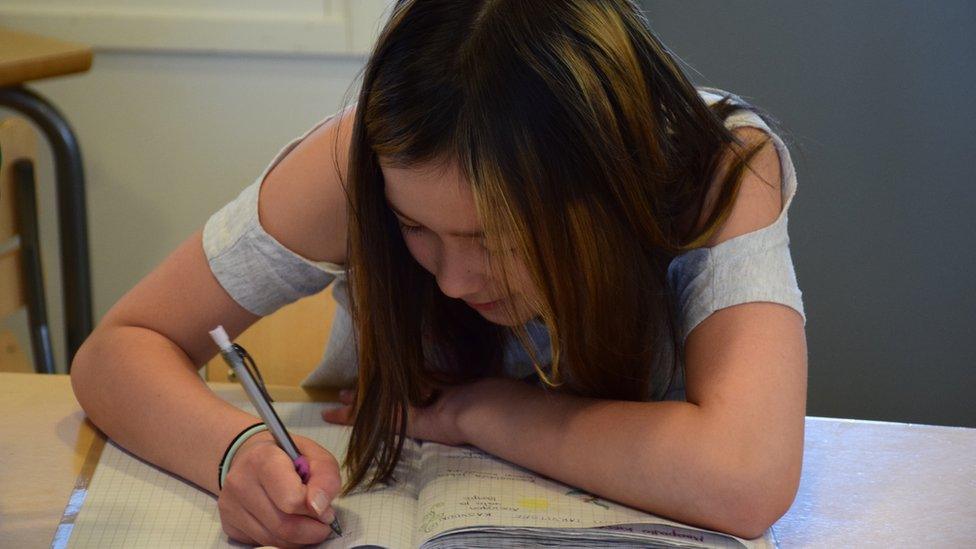
Pens and paper are still an important part of classroom life
Others worry that it is also adding to teachers' workloads and is disadvantaging older teachers who may not be as digitally able as their younger counterparts.
Jari Salminen of Helsinki University's faculty of education says similar types of learning have been tried in the past - as far back as 100 years ago - and have failed.
"Many international visitors are asking me, why are you changing this system when you get such good results? And it's a mystery to me, because we don't have any data from school level that phenomenon-based learning is improving results," Mr Salminen says.
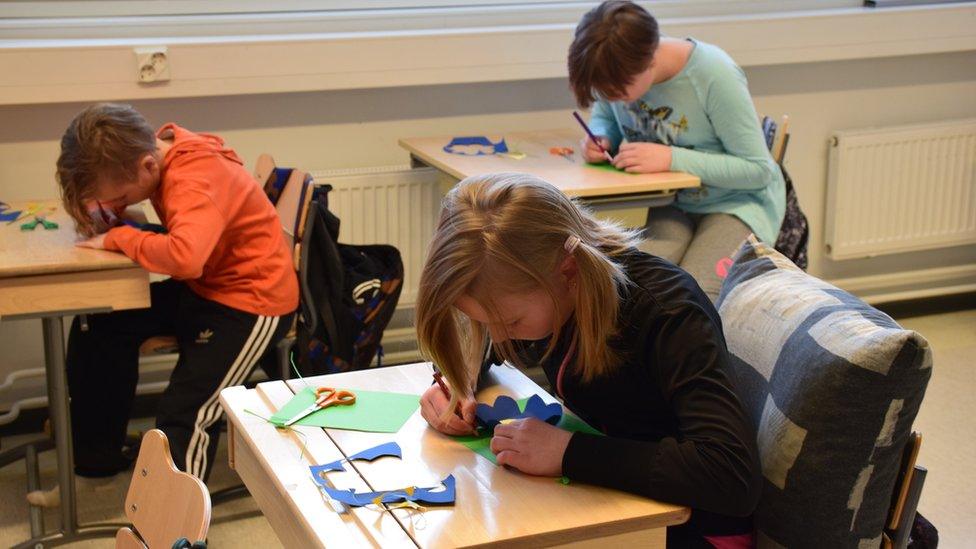
.... so too are arts and crafts
Anneli Rautiainen of Finland's national agency for education, external accepts there are concerns and says they are introducing the changes gradually: schools are only required to provide one such PBL project for its pupils a year.
"We want to encourage teachers to work in this way and for children to experience it, but we are starting it slowly. There are still subjects being taught and goals to be reached for each subject, but we also want skills to be embedded in that learning," she explains.
But what about results?
"We are not too keen on metrics in this country overall so we are not planning to measure the success of it, at least not for now. We are hoping it will show in the learning outcomes of our children as well as in the international tables such as Pisa," she says.

What's unusual about Finnish schools?
Teaching is a highly respected, well-paid profession
There are no school inspections or teacher evaluations
The school system is highly centralised and most schools are publicly funded
School days are short and the summer break is 10 weeks
Children are assessed by their teachers. The only nationwide exam is for those who continue studying to 18
Average school size is 195 pupils; average class size is 19 pupils
Success has been attributed to a traditionally high regard for teaching and reading, as well as a small, largely homogenous population
Though still high, Finland has been slipping down the Pisa rankings in recent years
Like other nations, it faces challenges of financial constraints and growing immigration

While not everyone is convinced by this revolution in Finnish teaching, it has been given the thumbs up by most students and parents at Hauho.
Sara, 14, says it is "not so tiring. It's much more interesting - I like that about it". Anna, also 14, says her older sister is envious because she thinks "school is much more fun than when she was here".
Mum Kaisa Kepsu says most parents she knows are positive about the changes to the curriculum. "There has been a wider discussion about the need to ensure children are still learning the basic facts, and I agree with that," she says. "But raising their motivation and making the world more interesting is also important. I don't see anything wrong with school being fun".

Could this approach work in the UK?
Some project-based learning does happen in UK schools already, says Tom Bennett, the government's classroom behaviour adviser, but on a much smaller scale than that planned for Finland.
And it is likely to remain that way, he says, as there is no compelling evidence that it is a more efficient way of teaching.
The Education Endowment Foundation (EEF) funded a trial of PBL, external that involved mixed-ability Year 7 children in 24 UK schools between 2014 and 2016.
The findings were skewed because a large number of schools dropped out of the study, largely because of the high level of management support and organisational change needed.
The trial found no evidence that PBL had a positive impact on pupils' literacy or their engagement with school and learning, the EEF said.
However, the independent evaluators did find that - from observations and feedback from schools - it could enhance pupils' skills in communication, teamwork and self-managed study.
- Published27 October 2016
- Published15 April 2015
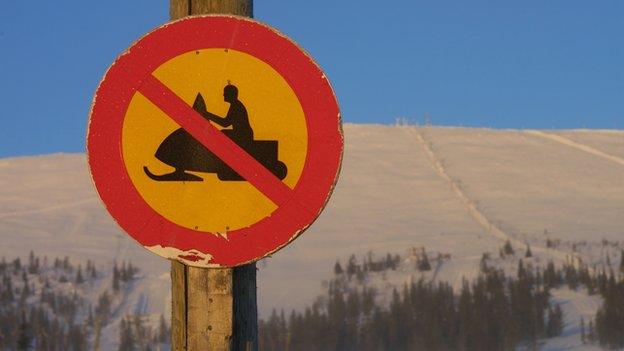
- Published16 January 2017
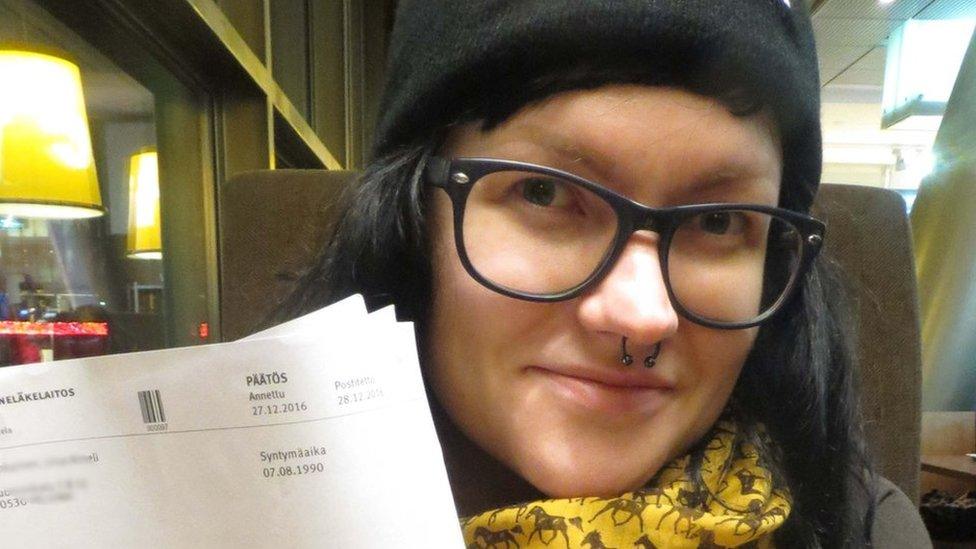
- Published25 November 2016
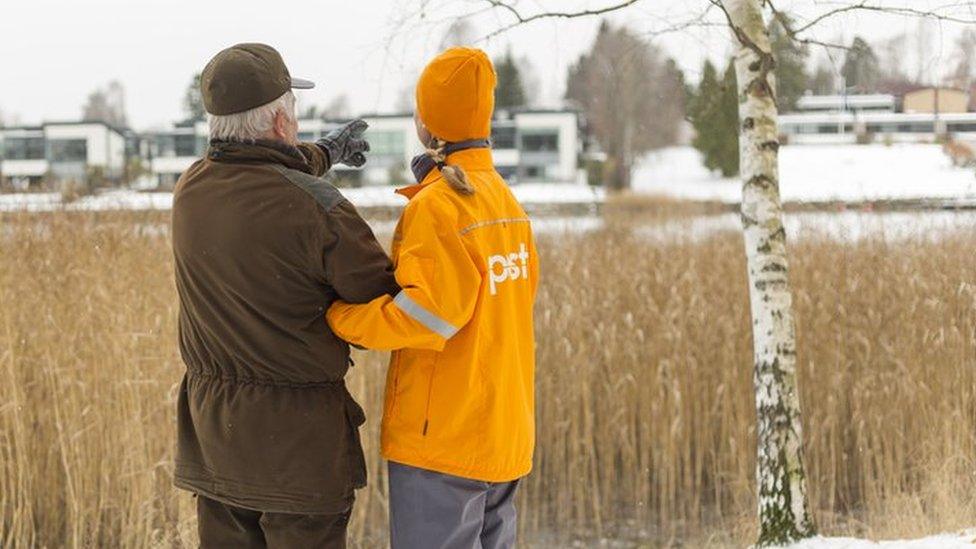
- Published13 February 2024
